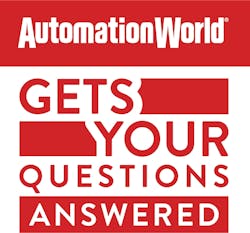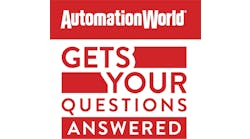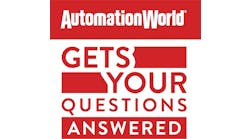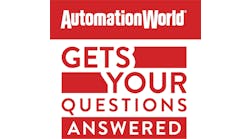TRANSCRIPT
Welcome to the Automation World Gets Your Questions Answered podcast. I’m David Greenfield, editor in chief at Automation World and in this episode, we’ll be looking at the growing use of cloud computing in industry and the surprising, but erroneous post from Microsoft that it was planning to discontinue a key component in its cloud platform.
So, if you been following cloud computing use in industry at all over the past several years, you wouldn’t have been able to miss how cloud use in the manufacturing industries has gone from being a cutting-edge data strategy used primarily by just the largest manufacturing companies….to a way to deliver critical operations technologies to companies that historically would not have been able to afford and/or support on-site implementations of the same software. And by using cloud-based versions of operations software, manufacturers are guaranteed to be running the latest and most secure version of the software available.
As commonplace as cloud computing has now become across industry—new offerings continue to emerge. For example, Rockwell Automation is combining its FactoryTalk HMI hardware with cloud software in its new FactoryTalk Optix portfolio which features remote access software as well as embedded edge compute modules to address a range of industrial deployment options. According to Rockwell, FactoryTalk Optix allows users to choose their own technology mix centered around the use of visualization software to design HMI applications that can natively work with Rockwell Automation and third-party controllers and displays via OPC UA. Since FactoryTalk Optix is cloud-based software-as-a-service technology, users only pay for the features they need with runtime licensing based on the capabilities of the application.
Hitachi Vantara, the data storage, infrastructure and hybrid cloud management subsidiary of Hitachi Ltd., also recently released the Hitachi Unified Compute Platform for Google Kubernetes Engine Enterprise with Google Cloud. This combination of technologies enables manufacturers to better manage hybrid cloud operations and applications support. Hybrid cloud operations, which involve the use of public clouds and private clouds, as well as on-premises data centers or edge computing applications, have become very common in industry as a way to keep immediately needed data on site while transferring other data to the cloud for storage and/or analysis. Hitachi Vantara says industry’s growing interest in hybrid cloud environments and generative AI technologies are behind their launch of the Hitachi Unified Compute Platform, as both of these technologies rely on cloud-native platforms that operate across multiple environments.
Considering the seemingly endless array of industrial technologies now dependent on the cloud, it was a surprise to see the announcement from Microsoft in mid-February of 2024 that said Microsoft would be retiring its Azure IoT Central platform, which is a part of Microsoft’s Azure cloud computing platform.
The notice from Microsoft was covered by a number tech media sources, such as The Register, which reported that: “Out of the blue Microsoft has decided to retire a key plank of its Azure IoT platform, leaving developers currently building systems high and dry. The Register noted that, in a statement on the Azure console, Microsoft had confirmed the Azure IoT Central service was scheduled to be retired on March 31, 2027.”
The Register also reported that the Microsoft announcement stated that “Starting on April 1, 2024, you won’t be able to create new application resources; however, all existing IoT Central applications will continue to function and be managed.” While rare, such an announcement does have precedence. As The Register noted: “IBM made a similar move to end its Watson IoT service at short notice in November 2022. It said it would "sunset the Watson IoT Platform service on IBM Cloud effective December 1st, 2023, without a direct replacement."
Needless to say, such as decision by Microsoft could significantly impact the manufacturing technology industry where Microsoft’s Azure and its Azure IoT platform are widely used.
Then, just a day after that announcement, Microsoft retracted the news about Azure IoT Central in a statement from Kam VedBrat on Microsoft’s Internet of Things Blog. According to VedBrat: “There was a recent erroneous system message on Feb 14th regarding the deprecation of Azure IoT Central. VedBrat said this message is not accurate and was presented in error. He added that Microsoft does not communicate product retirements using system messages. When we do announce Azure product retirements, he said, we follow our standard Azure service notification process including a notification period of 3-years before discontinuing support.”
There’s been no word yet on what led to the posting of this “erroneous system message”, but before the clarification from Microsoft came out, Automation World had reached out to several automation technology suppliers to learn how the retirement of Azure IoT Central could affect their products and services.
Surprisingly, some companies were not prepared to provide a response and did not offer any insights about Microsoft’s support for Azure IoT Central. However, two companies did respond to explain how such an action by Microsoft would not impact their products.
Brandon Stiffler, software product manager at Beckhoff USA, said, “If Azure ever discontinues the IoT Central product, they, along with all the other cloud providers, will continue to offer platforms and services that leverage standardized IoT protocols, such as MQTT, HTTP and OPC UA. Stiffler said Beckhoff has taken the approach of supporting and exposing the underlying technologies, rather than tightly coupling to any specific product or provider. He explained that this affords us the highest level of flexibility and compatibility with rapidly evolving cloud offerings.
Kent Melville, director of sales engineering at Inductive Automation, said “Ignition Cloud Edition is not impacted by this change. Ignition Cloud Edition also contains an MQTT broker out of the box so it will continue to be relevant. Melville added that data flowing to the cloud continues to be a trend in industry and we don’t see that going away any time soon. For data to be productive in the cloud it needs to easily flow between different applications. He said this was solved on the plant floor through the adoption of open standards. And in the cloud we are now seeing a consolidation of tools to adopt these standards and make the cloud feel more like home for the industrial space. He said Inductive Automation looks forward to continuing to offer products that leverage these open standards like OPC, MQTT with SparkPlug, SQL and APIs.
So, the upside to any concerns that such a decision from a major cloud provider could negatively impact operations for manufacturing users is that it appears automation technology suppliers are focusing their connectivity to such platforms on the underlying communication technologies, such as MQTT and OPC UA. As both Stiffler and Melville noted, this approach provides automation tech suppliers with the flexibility and application independence to adjust to any such notice and provide continued access to the capabilities they provide regardless of moves by the cloud service providers.
So thanks for checking out this episode of the Automation World Gets Your Questions Answered podcast series. And remember to keep watching this space to stay on top of the latest news, trends and insights on the world of industrial automation.




